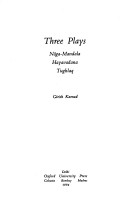Tughlaq is a historical play in the manner of the nineteenth-century Parsee theatre. It deals with the tumultous reign of the medieval Sultan, Muhammad Tuhlaq, a visionary, a poet and one of the most gifted individuals to ascend the throne of Delhi who also came to be considered one of the most spectacular failure in history. Hayavadana was one of the first modern Indian plays to employ traditional theatre techniques. The various conventions - music, mime, masks, the framing narrative, the mixing of human and non-human worlds - are here used for a simultaneous presentation of alternative points of view, for alternative analyses of human problem posed by a story from the Kathasaritsagar. In Naga-Mandala, Karnad turns to oral tales, usually narrated by women while feeding children in the kitchen. Two such tales are fused here. The first one comments on the paradoxical nature of oral tales in general: they have an existence of their own, independent of the teller, and yet live only when they are passed on from one to another. Ensconced within this is the story of a girl who makes up tales in order to come to grips with her life.
- ISBN10 0195633318
- ISBN13 9780195633313
- Publish Date 1 April 1994
- Publish Status Active
- Out of Print 26 June 2010
- Publish Country IN
- Imprint OUP India
- Format Hardcover (UK Trade)
- Pages 226
- Language English
